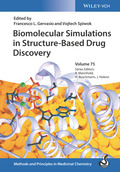Biomolecular Simulations in Structure-based Drug Discovery
Methods and Principles in Medicinal Chemistry

1. Auflage Februar 2019
XVI, 352 Seiten, Hardcover
82 Abbildungen (61 Farbabbildungen)
Handbuch/Nachschlagewerk
Kurzbeschreibung
This survey of modern simulation tools and their applications in real-life drug discovery allows every drug researcher to augment and replace laboratory assays with virtual experiments, for better and quicker results in structure-based drug design.
A guide to applying the power of modern simulation tools to better drug design
Biomolecular Simulations in Structure-based Drug Discovery offers an up-to-date and comprehensive review of modern simulation tools and their applications in real-life drug discovery, for better and quicker results in structure-based drug design. The authors describe common tools used in the biomolecular simulation of drugs and their targets and offer an analysis of the accuracy of the predictions. They also show how to integrate modeling with other experimental data.
Filled with numerous case studies from different therapeutic fields, the book helps professionals to quickly adopt these new methods for their current projects. Experts from the pharmaceutical industry and academic institutions present real-life examples for important target classes such as GPCRs, ion channels and amyloids as well as for common challenges in structure-based drug discovery. Biomolecular Simulations in Structure-based Drug Discovery is an important resource that:
-Contains a review of the current generation of biomolecular simulation tools that have the robustness and speed that allows them to be used as routine tools by non-specialists
-Includes information on the novel methods and strategies for the modeling of drug-target interactions within the framework of real-life drug discovery and development
-Offers numerous illustrative case studies from a wide-range of therapeutic fields
-Presents an application-oriented reference that is ideal for those working in the various fields
Written for medicinal chemists, professionals in the pharmaceutical industry, and pharmaceutical chemists, Biomolecular Simulations in Structure-based Drug Discovery is a comprehensive resource to modern simulation tools that complement and have the potential to complement or replace laboratory assays for better results in drug design.
Predictive power of biomolecular simulations
Molecular dynamics based approaches describing protein binding
Understanding allostery to design new drugs
Markov state models in drug design
PART 2: APPLICATIONS
Molecular dynamics applications to GPCR ligand design
Modelling ligand-target binding with enhanced-sampling simulations
From computers to bedside: Computational chemistry contributing to FDA approval
Using biomolecular simulations to target Cdc34 in cancer
Structure and stability of amyloid protofibrils of polyglutamine and polyasparagine from molecular dynamics simulations
Monte Carlo techniques for Drug Design. The success case of PELE
Ion channel simulations
Application of biomolecular simulations to G protein-coupled receptors (GPCRs)
Understanding structure and dynamics of small peptides and proteins through the lens of network science
Vojtech Spiwok is a researcher of University of Chemistry and Technology, Prague (Czech Republic). He has authored numerous scientific publications on biomolecular simulations with a special emphasis on development and application of enhanced sampling techniques.


